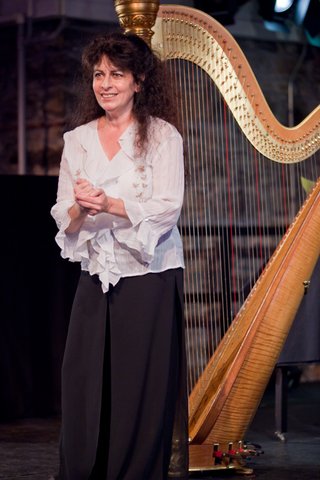Concert Review: “A Score To Settle” — A Monodrama About A Harpist and Her Seductive Slavedriver
Why, Rita Costanzi asks incredulously, do harpists, albeit occasionally, marry other harpists: “Does the word masochist mean anything to you?”
By Susan Miron
There doubtless have been evenings featuring pianists who intertwine narrative with keyboard playing, but as far as I know, there is nothing remotely like the tour de force that harpist-actress Rita Costanzi pulled off in her A Score to Settle at Boston Conservatory Thursday night. Talking—or acting—while playing the harp is extremely challenging because it really helps to look at the strings (not the audience) and to make sure your pedals (which are in charge of chromatic changes) are doing what they should be doing. Accomplishing all that and being a highly verbal drama queen at the same time raises the difficulty level considerably.
The monodrama A Score to Settle opens in a darkened room (Seully Hall, unfortunately, did not provide the intimate nightclub atmosphere this piece needs). Ms. Constanzi established her Serious Harp Credentials by performing one of two masterpieces for harp by Gabriel Fauré, Une Chatelaine en sa Tour (after a poem by Verlaine).
She then launched into a hilarious list of implausible events that happened on the day she was born: “Romantic, that’s how my life was meant to be. People had very high expectations for me. Then I ruined it all by deciding to become a musician.” She recalls amusing audiences at the age of three as if she was a wind-up doll. But then she again “ruined it” by deciding to be a harpist. “Talking is my nervous habit,” she admits between her beautiful harp selections (“Malaguena” by Albeniz, two movements from a Baroque sonata by Pescetti, a ravishing performance of Carrickferfus, an Irish folksong, a romantic piece known well to harpists by Marcel Tournier, The Minstrel’s Adieu to his Native Land by John Thomas). In “Requiem,” one of several pieces she composed for this show, Costanzi trills on two strings and sings into the back of the harp. Her compositions are quite accomplished; I loved her “Homage to Piazzola.”
Now, she ponders, people come to see her (read: any harpist) out of “morbid curiosity.” But the harp teaches her lessons. She talks about a performance when a string (below middle C) broke and she had to call out in the hall for, yes, a G string. This was, to her, the universe sending her “a message on the transience of life in the form of a broken string.” Why, Constanzi asks incredulously, do harpists, albeit occasionally, marry other harpists: “Does the word masochist mean anything to you?”
The death of Costanzi’s mother inspired her to create this piece in 2007, and the performer’s own mortality runs through the latter part of the program but always with a touch of whimsy and humor. “This beast will be my calling card in heaven,” she brags. “Heaven is about a second chance”—at least for harpists! “People will wonder why my coffin is shaped like a harp and why I was buried with a metronome.”
One of the evening’s most memorable segments involves a lecherous harp teacher, Monsieur Le Cochon. He used, she recalls with morbid understatement, “a somewhat physical approach.” One breast, he explained, “should face the audience, the other, the orchestra so that no one feels left out.” With a perfect French accent, she recounts how he snorted and, while she rehearsed the last movement (very tricky without talking) of Tournier’s “Sonatine,” “his hand played an upward glissando” on her leg.
Costanzi does a fabulous Carmen-plays-the-harp. She puts her foot on the soundboard (you have to be quite fit to do this!) takes the clip out of her unruly, long, curly hair, and plays “Malaguena” while her heel does a tap dance. She trills and bats her eyes (which have a personality of their own). But what makes this show extraordinary is not only the quality of Costanzi’s acting but her exquisite harp playing, which I (and the many harpists in attendance) found compelling and beautiful.
A Score to Settle debuted in NYC in October 2011. Costanzi’s collaborators are director Arthur Masella and writer Kico Gonzalez-Risso, who wrote two dramatic monologues for Costanzi (Harp and Solo, which premiered in NY in 2009, and A Score to Settle, which premiered in 2007 in Vancouver). While A Score to Settle is still a work in progress, the members of the team appreciate Costanzi’s multiple (manifold) gifts, and they are very much on the right artfully entertaining track.
Costanzi recalled seeing Marcel Marceau in her youth, the mask of happiness on his face accented by a tear trickling down a cheek: “When I’m playing, the mask is off. When I’m talking, the mask is on.” In a post-concert Q & A, Costanzi mused, “We grow up with dreams. But life doesn’t always work.” Despite her doubts, Constanzi’s new life as a harp-playing actress seems to be working just fine. I hope she and her show find a home off-Broadway.

